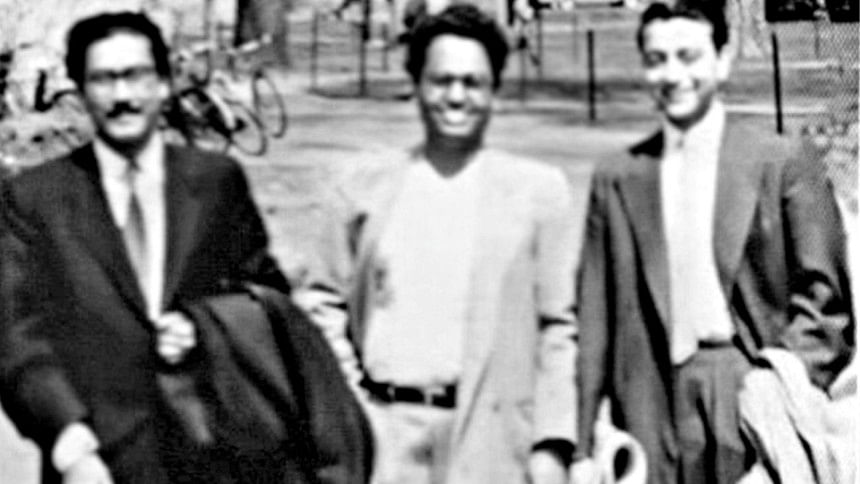In the company of the great man

I first saw Sheikh Mujibur Rahman, the future Bangabandhu and the father of a new nation, in 1946 when I went to Calcutta to begin my college education. He was then a final year student in Islamia College (now Maulana Azad College) where the formal attire of Muslim students was black achkan. A handsome man, Sheikh Mujib looked more handsome in his black achkan. He stayed in Baker Hostel, a dormitory for Muslim students, and sometimes frequented Elliot Road Hostel where a couple of my friends were staying.
As the right-hand man of Huseyn Shaheed Suhrawardy, Bangabandhu, at the age of 26, took a leading role in the movement for the establishment of Pakistan. To give further momentum to the movement, Muhammad Ali Jinnah called for observing August 16 as the Direct Action Day at a public meeting held at the Calcutta Maidan (popularly known as Garer Math). I, along with a friend, Wahidur Rahman, proceeded to attend the meeting by tram from Park Circus. As we reached the Dharmatala crossing, we found that the Kamalaloy, a prestigious department store, was being looted. There was panic everywhere and people were rushing to take shelter in safe places.
At Calcutta Maidan, we saw hordes of people waiting for the arrival of HS Suhrawardy, the chief minister, who finally came two hours later, and briefly addressed the meeting. He said: "Riot has started and is spreading like wildfire. You should return to your home as soon as possible." By that time, all public transports had stopped plying and we walked back home. The next few days, all hell broke loose in Calcutta. There were merciless killings as Calcutta got divided into two zones—that of Hindus and Muslims—and there was large-scale migration from one zone to another.
Lady Brabourne College at Park Circus was converted into a relief camp for the Muslim refugees. It is there that I got the first glimpse of the courage and fortitude of Sheikh Mujib. He was working day and night and moved truckloads of people, both Hindus and Muslims, from danger zones to safety. It was a high-risk operation but Bangabandhu risked his life and almost single-handedly saved thousands of innocent lives. In The Unfinished Memoirs, he described the incident in the following words:
"Arrangements had been made for refugees to stay in Lady Brabourne College; women would have to stay on the first floor and men on the ground floor. The workers were divided accordingly. I also helped in rescuing stranded Muslims in one or two places; I came under attack while trying to help in this work. We also rescued Hindus wherever possible and sent them to Hindu localities. It was obvious that people had lost their human sides in the violence and had regressed to their animal selves."
In 1956, Sheikh Mujib was appointed as the youngest Minister of Commerce, Labor and Industries in the Ataur Rahman government and very soon came to be known as a firebrand minister. His thinking process was clear and mature and the action followed was swift. The Dhaka Electric Supply Company was at that time under the management of a British firm, Octavius Steel, appointed by the Nurul Amin government. He thought that it was a waste of public money and that the local engineers were quite capable of running and managing an electric supply company. Without any delay, he initiated the process of terminating Octavius Steel's contract with the government and soon took over its management. I was then deputy secretary of the department of finance, and the minister ordered me to go to Chittagong to thoroughly examine the accounts of Octavius Steel.
As the deputy secretary, I was responsible for placing demands with the central government for loans and grants for the development projects in East Pakistan. It was frustrating work as the central government would often deny or delay requests for funds on some plea or the other. It was, therefore, a big surprise when I received a telegraphic message from the central government sanctioning Rs 1 crore for setting up a Film Development Corporation and another Rs 1 crore for setting up a Small Scale Industries Corporation, for execution by the department of commerce and industries. There was no formal request for funds for these two organisations from East Pakistan. It soon became clear that it was because of the political clout of the firebrand minister that East Pakistan got funds to develop these two important sectors.
Bangabandhu had a clear perception that the film industry in East Pakistan was in very bad shape and needed government support to survive and make quality films. The setting up of a corporation for developing small-scale industries was also his brainchild. He realised that skill development, access to funds and providing infrastructure are essential for developing small-scale industries in East Pakistan. Interestingly, West Pakistan followed suit and set up its own small-scale industries corporation.
I left for higher studies in Harvard in September 1957, and learned that Bangabandhu resigned as minister to devote all his time for the development of his party, another rare example. In December 1957, he went to the US under a leadership programme and his first stop was Boston, where he underwent surgery in the Boston General Hospital. I had the privilege of looking after him in the hospital and was his constant companion during his recuperation. The lifelong friendship, love and affection that I got from Bangabandhu ended when he was brutally assassinated on this day 42 years ago.
Md Matiul Islam was Bangladesh's first finance secretary.





Comments